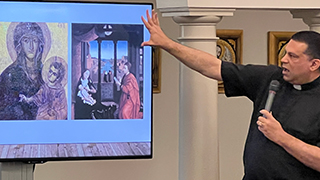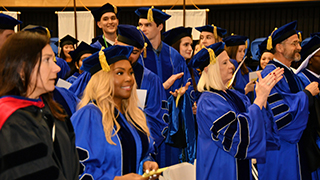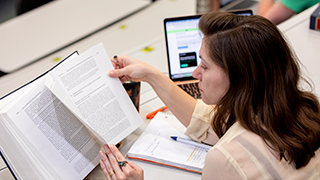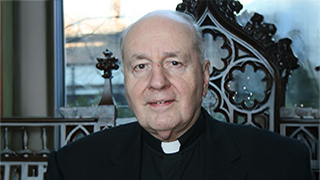Speech-Language Pathology Students Empower Children Who Stutter
Tuesday, September 17, 2024
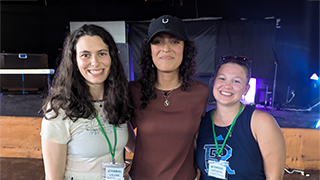
Valerie Gorsky (left) and Katie Hendrzak (right) with America's Got Talent winner and person who stutters, Amanda Mammana
This summer, two graduate students from the Department of Speech-Language Pathology at Seton Hall University volunteered their time with Camp Words Unspoken, a summer camp program for children and teens who stutter. This is one such activity offered by the Department of Speech-Language Pathology as part of our continued efforts to inspire great clinicians to find their clinical passions and professional purpose. This opportunity was sponsored by the Office of the Dean in the School of Health and Medical Sciences as a new, specialized program experience, aiming to foster the synthesis of graduate course content through impactful experiential learning. Using a student-centered approach, the opportunity was offered to students interested in learning more about stuttering and fluency disorders, an important domain of practice in speech-language pathology. Two student applicants were selected to represent the program at this week-long event in August of 2024. Below is a reflection offered by our two student representatives, Valerie Gorsky and Kathryn “Katie” Hendrzak.
A Reflection on Our Experience
At the start of the 2024 Spring semester, Professor Grabowski reached out to our cohort,
seeking volunteers to attend a camp for children who stutter. The email immediately
piqued our interest—one of us had fond memories of attending sleepaway camps as a
child, while the other had never experienced anything like it before. We were both
excited about the possibilities this unique opportunity could offer, and we were fortunate
to receive a generous travel stipend from the Office of the Dean of the School of
Health and Medical Sciences to attend the camp.
Camp Words Unspoken was founded in 2022 by Brandon Towle, a person who stutters, as a way to connect children who stutter with others who share their experience—something he didn’t have the chance to do until adulthood. The camp aims to provide a supportive environment where the campers can embrace their stutter without fear of judgment. The campers are encouraged and supported by a dedicated speech team along with cabin counselors, many of whom also stutter or had stuttered earlier in life. According to the Cleveland Clinic, “Nearly 40 percent of children aged 12 to 17 who stutter also experience conditions like anxiety or depression” (2022). This is why the camp is so important—it offers a supportive, judgment-free community where campers can feel accepted and express themselves freely, without their stutter holding them back. For many, it's their first time meeting someone else who stutters, creating a sense of belonging they’ve never had before. This camp becomes a home away from home, where they can step away from their fears and work through them in a safe, encouraging environment.
This year, the camp hosted 35 campers aged 8 to 16, 23 of whom were returning. We were the only two graduate student volunteers from New Jersey, while others came from Massachusetts, Vermont, New Hampshire and Maine. Our speech team was diverse, consisting of graduate students, SLPAs, speech therapists and clinical fellows (CFs), with each of us co-leading a speech group. The ten of us were divided into five speech groups, each organized by age. We had the opportunity to connect with a wide range of individuals in the SLP community, gaining insight into their experiences and comparing them to our own. Coming from diverse backgrounds with varying levels of knowledge in the field, we each contributed unique ideas and perspectives, while also learning from one another.
The camp’s daily schedule was packed with activities, including two one-hour speech sessions in small groups, various choice activities, all-camp events, and an hour each at the pool and the lake. We were fortunate to co-lead a group together, allowing us to build strong connections with each of our campers. We gained valuable insights into their experiences with stuttering and how it impacts their daily lives. We asked how we could continue to support them moving forward. We weren’t restricted to just working in the speech groups; we got to know all of the campers outside of our group and bonded with them, deepening our understanding of their experiences with stuttering.
Two camp experiences stand out as our favorites. The first was the evening “Speak Out,” where the entire camp gathered around a campfire to share the highlights of their day and moments when they stepped outside their comfort zones. They would talk about anything, from trying the obstacle course on the lake to discussing Taylor Swift with their counselors. Creating a safe environment where the campers felt free to be themselves also facilitated sharing very personal feelings about their stutter. The second experience was meeting Amanda Mammana, a semifinalist on America’s Got Talent and a person who stutters. She spoke to the camp about her journey and even sang with us, leaving a profound impact on both campers and counselors.
In our graduate coursework, we’re taught the fundamentals of assessment and intervention for fluency disorders, including fluency shaping, stuttering modification techniques, and some counseling aspects. However, this experience illuminated for us that treatment of stuttering, or any communication disorder, requires equal parts evidence-based clinical service and emphasis on counseling and adjustment, or in this case, an acceptance-based approach. We learned that for a person who stutters, stuttering can be a part of their identity. It is therefore important to provide clients with the time and space to embrace their identity, just as much as an SLP may want to work with them to achieve smooth speech. As one of the camp counselors pointed out, once you accept your stutter, the negative emotions and thoughts surrounding it become easier to manage. Dysfluencies are a natural part of life, and expecting 100 percent fluency all the time is unrealistic. We don’t ask that of people who don’t stutter, so why should we ask it of those who do?
This experience has shifted our mindset toward a more stutter-affirming approach, and we plan to incorporate this perspective when working with future clients who stutter, along with other client populations. We are excited to maintain our connections with the staff throughout the year and hope to return to Camp Words Unspoken in 2025. We are deeply grateful for this opportunity, which allowed us to delve into the complexities of fluency disorders, and we extend our thanks to Dean Vikram Dayalu, Ph.D., CCC-SLP, whose passion and expertise in this area of speech-language pathology is evident in his support of our learning. After our time at this camp, we can confidently say that working with fluency cases is something we intend to pursue after graduating from the Master of Speech-Language Pathology program at Seton Hall University.
For more information contact Caryn Grabowski, chair and program director, Department of Speech-Language Pathology.
Categories: Health and Medicine

